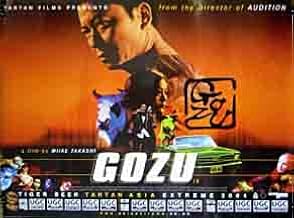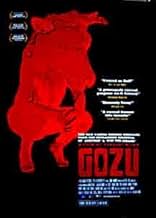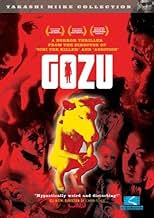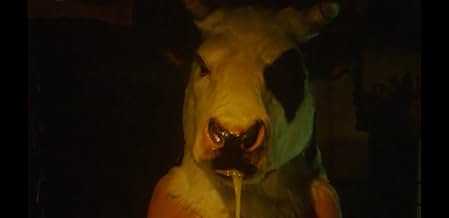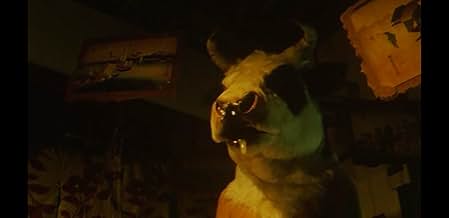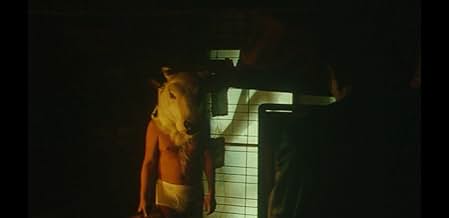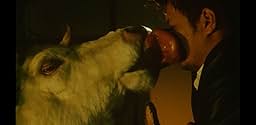VALUTAZIONE IMDb
6,9/10
13.153
LA TUA VALUTAZIONE
A un sicario della yakuza viene ordinato di guidare segretamente il viaggio dove dovrà assassinare il suo amato collega. Ma quando il collega scompare durante il viaggio, quello si trasforma... Leggi tuttoA un sicario della yakuza viene ordinato di guidare segretamente il viaggio dove dovrà assassinare il suo amato collega. Ma quando il collega scompare durante il viaggio, quello si trasforma in un'esperienza contorta, surreale e orribile.A un sicario della yakuza viene ordinato di guidare segretamente il viaggio dove dovrà assassinare il suo amato collega. Ma quando il collega scompare durante il viaggio, quello si trasforma in un'esperienza contorta, surreale e orribile.
- Regia
- Sceneggiatura
- Star
- Premi
- 5 vittorie e 4 candidature totali
Recensioni in evidenza
Takashi Miike's stark, "Yakuza Horror Theatre" presentation Gozu (2003) is an infernal cinematic nightmare of fear and anxiety, played out within a sepia-toned subterranean underworld abstracted to the point of outright parody. Like many of the director's more personal and idiosyncratic pictures, the plot is largely secondary to the uncomfortable atmosphere and wild sense of spectacle presented on screen, as Miike constructs an absurd and enigmatic story of a loyal Yakuza henchman struggling with issues of homosexuality, guilt and desire when he is required by his boss to "dispose" of his mentally unstable brother in arms. This incredibly personal and moral dilemma - in which the central character must juggle the greater notions of loyalty to his boss and the loyalty to his best-friend and mentor-like figure that he's obviously quite attracted to - creates a rift within the world of the film that plunges the whole story into suffocating surrealism, horror and the absurd.
As with his other great masterworks, such as Audition (1999), Birds (2000), Visitor Q (2001) and The Happiness of the Katakuris (2001), Miike takes the story in so many continually contrasting and self-consciously abstract directions as to render any notion of a single interpretation entirely void. Instead, he bombards the audience with a seemingly endless barrage of repeatedly warped visions, uncomfortable scenarios and bursts of disarming black comedy to continually shock, amuse and perturb us into a sense of ultimate submission. Eventually, the point of the film becomes less important that the sub-textual ideas behind it and the surreal and over-the-top manner in which the director depicts it - with the tone of the film switching continually from the first scene to the last, as the absurdities of the Yakuza genre that Miike knows so well are persistently ripped-to-shreds and turned into fodder for this meta-physical, psycho-sexual conundrum.
With this in mind, it is best to approach Gozu as a prolonged nightmare, complete with personal demons and elements of religious imagery interweaving, as all notions of character and conventional narrative development are done away with in favour of an almost stream of consciousness presentation where the real, the dream and the purely metaphorical are smashed together and left in shards for the audience to reinterpret as they see fit. With Gozu, more so than any of his other recent pictures, Miike takes his personal style further than even the hall-of-mirrors-like surrealism of Audition; creating a dark and distorted recreation of a nameless Japanese underworld that is labyrinthine and claustrophobic throughout, whilst simultaneously jarring us back and forth with Buddhist symbolism, bizarre caricatures and a continual hum of aural, industrialised ambiance. The whole thing is further heightened by the glowing yellow sepia tones of the cinematography, merging with the occasional shards of red and blue lighting, the lingering shadows around the edges of the frame and the often distancing and exaggerated camera angles and choices of location.
With these factors in place, it would be easy to categorise Gozu as a horror film; however, this simply isn't the case. As with many of Miike's more iconic films, Gozu follows no singular genre or style; moving freely between the characteristics of illogical comedy, knock-about buddy picture, gritty Yakuza-thriller, unrequited romance and psychological horror story seemingly simultaneously. Obviously, when we take this approach into consideration, Gozu won't be the kind of film that appeals to everyone, with a certain interest and familiarity with Miike as a filmmaker required by the audience to really appreciate the sense of humour and the continual shifts in tone. Even then, multiple viewing will be needed for the audience to fully digest the film's central message and layers of potential interpretation. However, it's definitely worth it, especially for anyone with a keen interest in the work of similarly minded filmmakers like David Lynch, Terry Gilliam, Sogo Ishii, Ken Russell, David Cronenberg and Shinya Tsukamoto.
Gozu takes the surreal horror and ambient farce of films like The Happiness of the Katakuris and Visitor Q to the next conceivable level of cinematic deconstruction, self-reference and meta-textual despair; as we literally submerge ourselves in a homosexual love story played out against a self-aware purgatory-like construction, rife with the allusions to the filmmakers aforementioned, and further applied alongside the desolate use of landscapes, jarring shifts from parody to horror and the freewheeling structure of the narrative itself. Combined with the fine performances from Hideki Sone, Kimika Yoshino, Tetsurô Tamba and Miike regulars Sho Aikawa and Renji Ishibashi, Gozu is easily one of its directors best and most unique endeavours; an arch, dead-pan, deranged and often dangerous sub-textual trawl through one man's despair and Freudian confusion dressed up as a post-apocalyptic fable of ridiculous gangster theatrics, role playing, gender metamorphosis and pure, existentialist angst.
As with his other great masterworks, such as Audition (1999), Birds (2000), Visitor Q (2001) and The Happiness of the Katakuris (2001), Miike takes the story in so many continually contrasting and self-consciously abstract directions as to render any notion of a single interpretation entirely void. Instead, he bombards the audience with a seemingly endless barrage of repeatedly warped visions, uncomfortable scenarios and bursts of disarming black comedy to continually shock, amuse and perturb us into a sense of ultimate submission. Eventually, the point of the film becomes less important that the sub-textual ideas behind it and the surreal and over-the-top manner in which the director depicts it - with the tone of the film switching continually from the first scene to the last, as the absurdities of the Yakuza genre that Miike knows so well are persistently ripped-to-shreds and turned into fodder for this meta-physical, psycho-sexual conundrum.
With this in mind, it is best to approach Gozu as a prolonged nightmare, complete with personal demons and elements of religious imagery interweaving, as all notions of character and conventional narrative development are done away with in favour of an almost stream of consciousness presentation where the real, the dream and the purely metaphorical are smashed together and left in shards for the audience to reinterpret as they see fit. With Gozu, more so than any of his other recent pictures, Miike takes his personal style further than even the hall-of-mirrors-like surrealism of Audition; creating a dark and distorted recreation of a nameless Japanese underworld that is labyrinthine and claustrophobic throughout, whilst simultaneously jarring us back and forth with Buddhist symbolism, bizarre caricatures and a continual hum of aural, industrialised ambiance. The whole thing is further heightened by the glowing yellow sepia tones of the cinematography, merging with the occasional shards of red and blue lighting, the lingering shadows around the edges of the frame and the often distancing and exaggerated camera angles and choices of location.
With these factors in place, it would be easy to categorise Gozu as a horror film; however, this simply isn't the case. As with many of Miike's more iconic films, Gozu follows no singular genre or style; moving freely between the characteristics of illogical comedy, knock-about buddy picture, gritty Yakuza-thriller, unrequited romance and psychological horror story seemingly simultaneously. Obviously, when we take this approach into consideration, Gozu won't be the kind of film that appeals to everyone, with a certain interest and familiarity with Miike as a filmmaker required by the audience to really appreciate the sense of humour and the continual shifts in tone. Even then, multiple viewing will be needed for the audience to fully digest the film's central message and layers of potential interpretation. However, it's definitely worth it, especially for anyone with a keen interest in the work of similarly minded filmmakers like David Lynch, Terry Gilliam, Sogo Ishii, Ken Russell, David Cronenberg and Shinya Tsukamoto.
Gozu takes the surreal horror and ambient farce of films like The Happiness of the Katakuris and Visitor Q to the next conceivable level of cinematic deconstruction, self-reference and meta-textual despair; as we literally submerge ourselves in a homosexual love story played out against a self-aware purgatory-like construction, rife with the allusions to the filmmakers aforementioned, and further applied alongside the desolate use of landscapes, jarring shifts from parody to horror and the freewheeling structure of the narrative itself. Combined with the fine performances from Hideki Sone, Kimika Yoshino, Tetsurô Tamba and Miike regulars Sho Aikawa and Renji Ishibashi, Gozu is easily one of its directors best and most unique endeavours; an arch, dead-pan, deranged and often dangerous sub-textual trawl through one man's despair and Freudian confusion dressed up as a post-apocalyptic fable of ridiculous gangster theatrics, role playing, gender metamorphosis and pure, existentialist angst.
Takashi Miike is a very strange man - I think there's sufficient evidence of that fact that I need not justify it further. So if I tell you that GOZU is probably Miike's weirdest film to date, you will know that we are talking some world-class oddity. Billed as a "Yakuza Horror" film, which is a label that just about fits if you consider that Japanese horror films have always shown a very different sensibility than Hollywood films (Japanese horror is generally of a quite intangible nature, about the horror of the unknown and the incomprehensible - not so much about the big scary monsters). GOZU is interesting in that the "horror" of it comes almost entirely from the way it is filmed - the camera work, the editing and the sound effects all come together to create a sense of foreboding and fear that for the most part is not at all born out by the actual events in the film. Miike is probably making the point that most horror films are just exercises in film-making technique these days, rather than presenting truly frightening content. Or perhaps he just fancied a way to make his latest Yakuza film a little bit different :)
Miike is definitely one of the most creative film-makers working in the world today - quite possibly *the* most, given his insanely prolific output and the fact that almost every film he makes manages to be unique and memorable. Doing that with one film a year would be an impressive feat, and Miike gives us at least 3-4 such films every year. GOZU shows him on fine creative form once more, turning a story that probably isn't all that interesting into a surreal, dreamlike experience. The plot itself is very minimal, and largely irrelevant for most of the 125 minute running time. Basically, a Yakuza is told to take his yakuza-brother (Sho Aikawa) to an out of the way part of Japan and get rid of him, as he been showing signs of going a bit loopy. However, before he can carry out his orders, Aikawa disappears - and most of the rest of the film is concerned with Minami's efforts to find him. But that description really sells short the content of the film, which is really about the strange characters he encounters and the even stranger experiences that he has.
Going into more detail about what happens wouldn't add a lot to this review, so I won't. Just be prepared to "go with the flow" and see what the film has to offer, rather than expecting anything specific from it. Don't expect a nice neat resolution at the end, either, 'cause you'll definitely be disappointed. Miike's films are often films that need to be seen in just the right mood to be enjoyed, and I'm glad I made the decision that my mood wasn't right when I started watching GOZU 6 months ago. The film sat there waiting for me until this weekend, when I figured the time was as good as it was going to get, and it paid off in spades :)
Miike's films often suffer on repeat viewings, and I am pretty sure this will be true of GOZU - at over 2 hours it is definitely too long, and there are sure to be scenes that are a bit of a chore to sit through when you know what's coming. I couldn't say which scenes they are from a first viewing though, so there's nothing that's truly redundant in there, and I hope that the US distributors that recently acquired the film will remember that their viewers would rather make the decision themselves about any scenes that weren't needed. i.e. uncut, please!
Miike is definitely one of the most creative film-makers working in the world today - quite possibly *the* most, given his insanely prolific output and the fact that almost every film he makes manages to be unique and memorable. Doing that with one film a year would be an impressive feat, and Miike gives us at least 3-4 such films every year. GOZU shows him on fine creative form once more, turning a story that probably isn't all that interesting into a surreal, dreamlike experience. The plot itself is very minimal, and largely irrelevant for most of the 125 minute running time. Basically, a Yakuza is told to take his yakuza-brother (Sho Aikawa) to an out of the way part of Japan and get rid of him, as he been showing signs of going a bit loopy. However, before he can carry out his orders, Aikawa disappears - and most of the rest of the film is concerned with Minami's efforts to find him. But that description really sells short the content of the film, which is really about the strange characters he encounters and the even stranger experiences that he has.
Going into more detail about what happens wouldn't add a lot to this review, so I won't. Just be prepared to "go with the flow" and see what the film has to offer, rather than expecting anything specific from it. Don't expect a nice neat resolution at the end, either, 'cause you'll definitely be disappointed. Miike's films are often films that need to be seen in just the right mood to be enjoyed, and I'm glad I made the decision that my mood wasn't right when I started watching GOZU 6 months ago. The film sat there waiting for me until this weekend, when I figured the time was as good as it was going to get, and it paid off in spades :)
Miike's films often suffer on repeat viewings, and I am pretty sure this will be true of GOZU - at over 2 hours it is definitely too long, and there are sure to be scenes that are a bit of a chore to sit through when you know what's coming. I couldn't say which scenes they are from a first viewing though, so there's nothing that's truly redundant in there, and I hope that the US distributors that recently acquired the film will remember that their viewers would rather make the decision themselves about any scenes that weren't needed. i.e. uncut, please!
From the twisted minds of Takashi Miike and Sakichi Sato comes this atmospheric and absurd crime comedy about a Yakuza underlings' quest to find his missing colleague. To discuss the plot any further would be an exercise in cruelty to uninitiated viewers, as to watch this film without knowing what'll happen next- or without knowing anything about it at all, for that matter- is an experience like no other. It's a terrifyingly hilarious tour through the subconscious to the darkest recesses of the mind, featuring the Lynchian-Cronenbergian mix of horror and comedy that is the hallmark of Takashi Miike's best work.
Hideki Sone- now known as Yuta Sone- plays the central character, Minami. A low-level Yakuza, Sone's Minami is a perfect conduit for the audience as the film burrows into the dark and strange. He is as disturbed by the spectacle of madness that confronts him as many viewers likely will be. At times the character bears a resemblance to Anthony Perkins' K in Orson Welles' version of 'The Trial', in that everyone around him doesn't appear at all disturbed by the confusing, bizarre scenes that are occurring. Minami is the only one perturbed by the happenings in 'Gozu', and Sone's naturalistic, bewildered performance is pitch perfect for the role.
Show Aikawa plays Minami's missing colleague Ozaki, and he is brilliantly unhinged. A frequent collaborator of Miike's, Aikawa is a very versatile actor with the admirable, enviable ability to give believable, grounded performances as outrageous characters (see him in Miike's 'Dead or Alive' series for proof of this notion). Few roles he's played have been as crazy as Ozaki though, a violent, paranoid Yakuza distrustful of dogs and humans alike. Though he has relatively little screen time, Aikawa leaves a lasting impression; and 'Gozu' may be one of the most memorable movies he's made with Miike.
The rest of the cast is made up of talented performers, with Renji Ishibashi- another frequent collaborator of Miike's- and Keiko Tomita standing out, playing two sick, strange characters. Miike usually gives Ishibashi roles as creepy, twisted people; and his character in 'Gozu'- a ladle-loving sadomasochist- may be the creepiest of the lot. Tomita plays an innkeeper Minami encounters along the way who has a very weird secret and she steals her scenes completely.
Kazunari Tanaka's cinematography is unobtrusively refined and he captures the outlandishly bizarre images in the film with real panache. Sakichi Sato and Miike worked together two years before on 'Ichi the Killer,' and his script for 'Gozu' is terrifically weird and wonderfully sinister- not to mention bizarrely funny. The film doesn't take itself too seriously- though its themes are dark and deep- and his strong screenplay reflects this. Many times, while wondering what the peculiar images signify and just what the hell is going on; most will also be laughing while watching 'Gozu.'
Yes, while most will find humour alongside the macabre in 'Gozu', it is almost a certainty that some will be nothing more or less than disgusted and discouraged at the spectacle of psychological, abstract horror in the film. If you are squeamish or easily perturbed, you should probably avoid it at all costs. If you appreciate the complex, the strange and the dark, however; then 'Gozu' is the film for you.
Hideki Sone- now known as Yuta Sone- plays the central character, Minami. A low-level Yakuza, Sone's Minami is a perfect conduit for the audience as the film burrows into the dark and strange. He is as disturbed by the spectacle of madness that confronts him as many viewers likely will be. At times the character bears a resemblance to Anthony Perkins' K in Orson Welles' version of 'The Trial', in that everyone around him doesn't appear at all disturbed by the confusing, bizarre scenes that are occurring. Minami is the only one perturbed by the happenings in 'Gozu', and Sone's naturalistic, bewildered performance is pitch perfect for the role.
Show Aikawa plays Minami's missing colleague Ozaki, and he is brilliantly unhinged. A frequent collaborator of Miike's, Aikawa is a very versatile actor with the admirable, enviable ability to give believable, grounded performances as outrageous characters (see him in Miike's 'Dead or Alive' series for proof of this notion). Few roles he's played have been as crazy as Ozaki though, a violent, paranoid Yakuza distrustful of dogs and humans alike. Though he has relatively little screen time, Aikawa leaves a lasting impression; and 'Gozu' may be one of the most memorable movies he's made with Miike.
The rest of the cast is made up of talented performers, with Renji Ishibashi- another frequent collaborator of Miike's- and Keiko Tomita standing out, playing two sick, strange characters. Miike usually gives Ishibashi roles as creepy, twisted people; and his character in 'Gozu'- a ladle-loving sadomasochist- may be the creepiest of the lot. Tomita plays an innkeeper Minami encounters along the way who has a very weird secret and she steals her scenes completely.
Kazunari Tanaka's cinematography is unobtrusively refined and he captures the outlandishly bizarre images in the film with real panache. Sakichi Sato and Miike worked together two years before on 'Ichi the Killer,' and his script for 'Gozu' is terrifically weird and wonderfully sinister- not to mention bizarrely funny. The film doesn't take itself too seriously- though its themes are dark and deep- and his strong screenplay reflects this. Many times, while wondering what the peculiar images signify and just what the hell is going on; most will also be laughing while watching 'Gozu.'
Yes, while most will find humour alongside the macabre in 'Gozu', it is almost a certainty that some will be nothing more or less than disgusted and discouraged at the spectacle of psychological, abstract horror in the film. If you are squeamish or easily perturbed, you should probably avoid it at all costs. If you appreciate the complex, the strange and the dark, however; then 'Gozu' is the film for you.
Another unique outing by Takeshi Miike. Way off the wall. A yakuza soldier finds himself searching for his brother (possibly dead) in a town full of lunatics and cow-headed demons. Weird Buddhist and Freudian symbols abound. One can't help but draw comparisons to David Lynch's work -- in particular Lost Highway and Mulholland Drive. I think Miike has admitted as much himself. Highly imaginative filmmmaking. My only complaint is the pacing. It's way slow for like the first hour. I had the same problem with Audition. I can appreciate the patient construction of a creepy mood, but I think Miike could step on the gas every now and then. Still, I recommend this one. It's quite a trip. There's also a fair dose of tongue-and-cheek humor in this film. (I guess it depends on one's sense of humor.)
Dog-lovers will delight in the opening scene.
Dog-lovers will delight in the opening scene.
i did not know anything about Miike when i saw Gozu. i read about Gozu in a magazine randomly and it sounded like something i had to see. then i waited a few weeks until it was in the theatres here. i told my fellow David Lynch fan officemate "hey, here is this movie which sounds cool, i think we both need to see this".
so we went. afterwards we left the theatre in a state of amazement. we had seen and enjoyed "weird" movies all our lives, Lynch, Cronenberg, whatever. we both enjoyed surrealism in general. even so, Gozu was really a peak experience.
but you can't just be weird for the sake of weird... is Gozu good? definitely. it is well-made, beautiful,... and it speaks to a deep visceral part at times. and then turn ridiculous and made you laugh... but even in the weirdest movies you have seen, there is probably more linearity and perhaps some symbolism you can conjure up. i think with Gozu, the way to see it is, just watch and let it take you. open your mind a little more than usual. otherwise i don't know what effect this movie can have on someone. for me, it was very significant. i immediately went and saw it again the next night (which was the last night it was playing) and my appreciation grew.
Miike is amazing. very talented director. good use of sound as well as the great visuals everyone talks about. i am looking forward to more of his work.
so we went. afterwards we left the theatre in a state of amazement. we had seen and enjoyed "weird" movies all our lives, Lynch, Cronenberg, whatever. we both enjoyed surrealism in general. even so, Gozu was really a peak experience.
but you can't just be weird for the sake of weird... is Gozu good? definitely. it is well-made, beautiful,... and it speaks to a deep visceral part at times. and then turn ridiculous and made you laugh... but even in the weirdest movies you have seen, there is probably more linearity and perhaps some symbolism you can conjure up. i think with Gozu, the way to see it is, just watch and let it take you. open your mind a little more than usual. otherwise i don't know what effect this movie can have on someone. for me, it was very significant. i immediately went and saw it again the next night (which was the last night it was playing) and my appreciation grew.
Miike is amazing. very talented director. good use of sound as well as the great visuals everyone talks about. i am looking forward to more of his work.
Lo sapevi?
- QuizThe store-owner's American wife knew no Japanese, and had to read her lines phonetically off cue cards posted above her head. She proved to be absolutely hopeless at anything resembling proper pronunciation or competent acting. Director Takashi Miike found the result interesting and displayed the cards for a simultaneously eerie and comedic effect.
- ConnessioniFeatured in Horror's Greatest: Japanese Horror (2024)
I più visti
Accedi per valutare e creare un elenco di titoli salvati per ottenere consigli personalizzati
Dettagli
- Data di uscita
- Paese di origine
- Sito ufficiale
- Lingua
- Celebre anche come
- Yakuza Horror Theater: Gozu
- Luoghi delle riprese
- Aziende produttrici
- Vedi altri crediti dell’azienda su IMDbPro
Botteghino
- Lordo Stati Uniti e Canada
- 58.202 USD
- Fine settimana di apertura Stati Uniti e Canada
- 5030 USD
- 1 ago 2004
- Lordo in tutto il mondo
- 58.633 USD
Contribuisci a questa pagina
Suggerisci una modifica o aggiungi i contenuti mancanti



